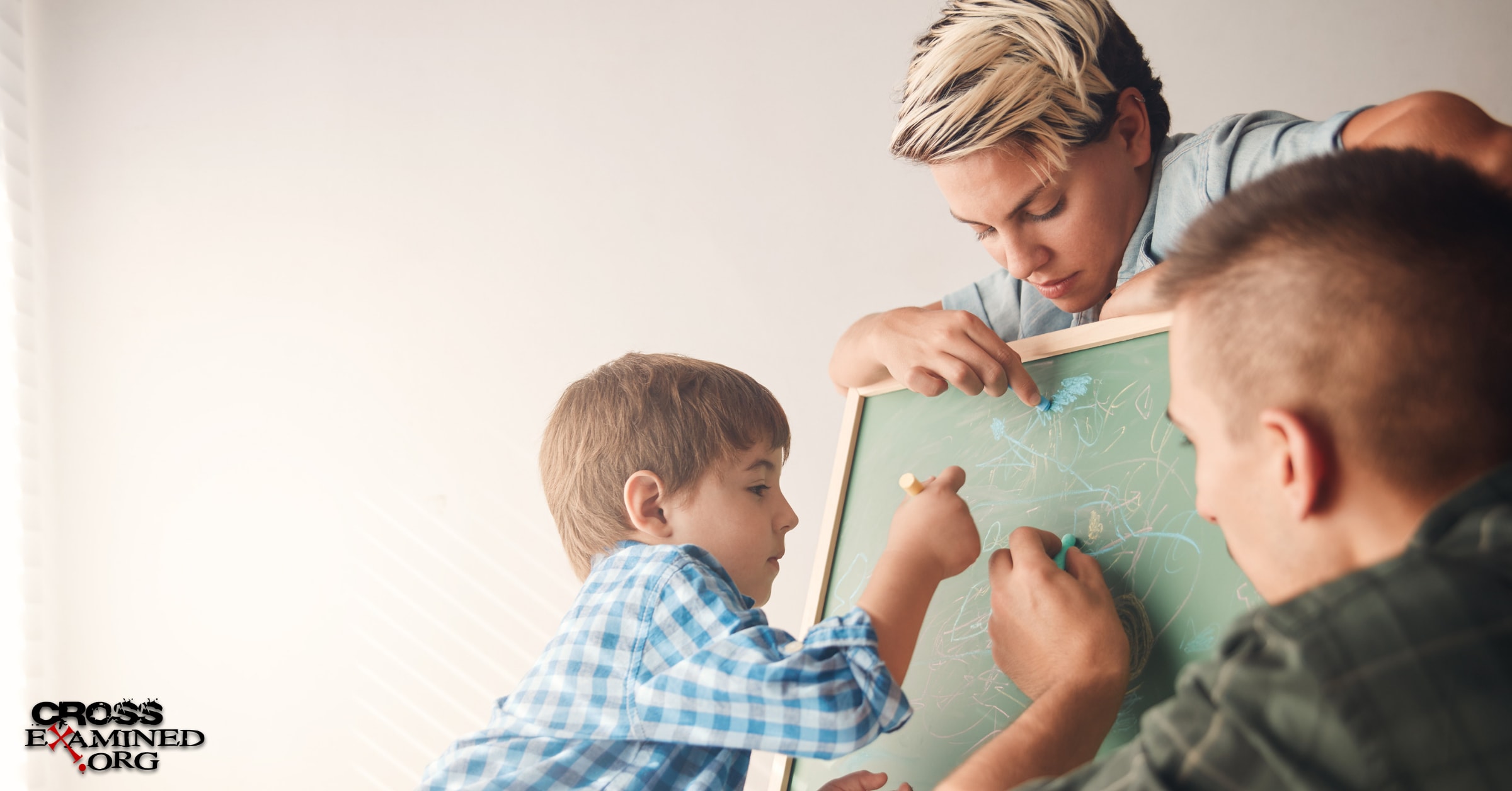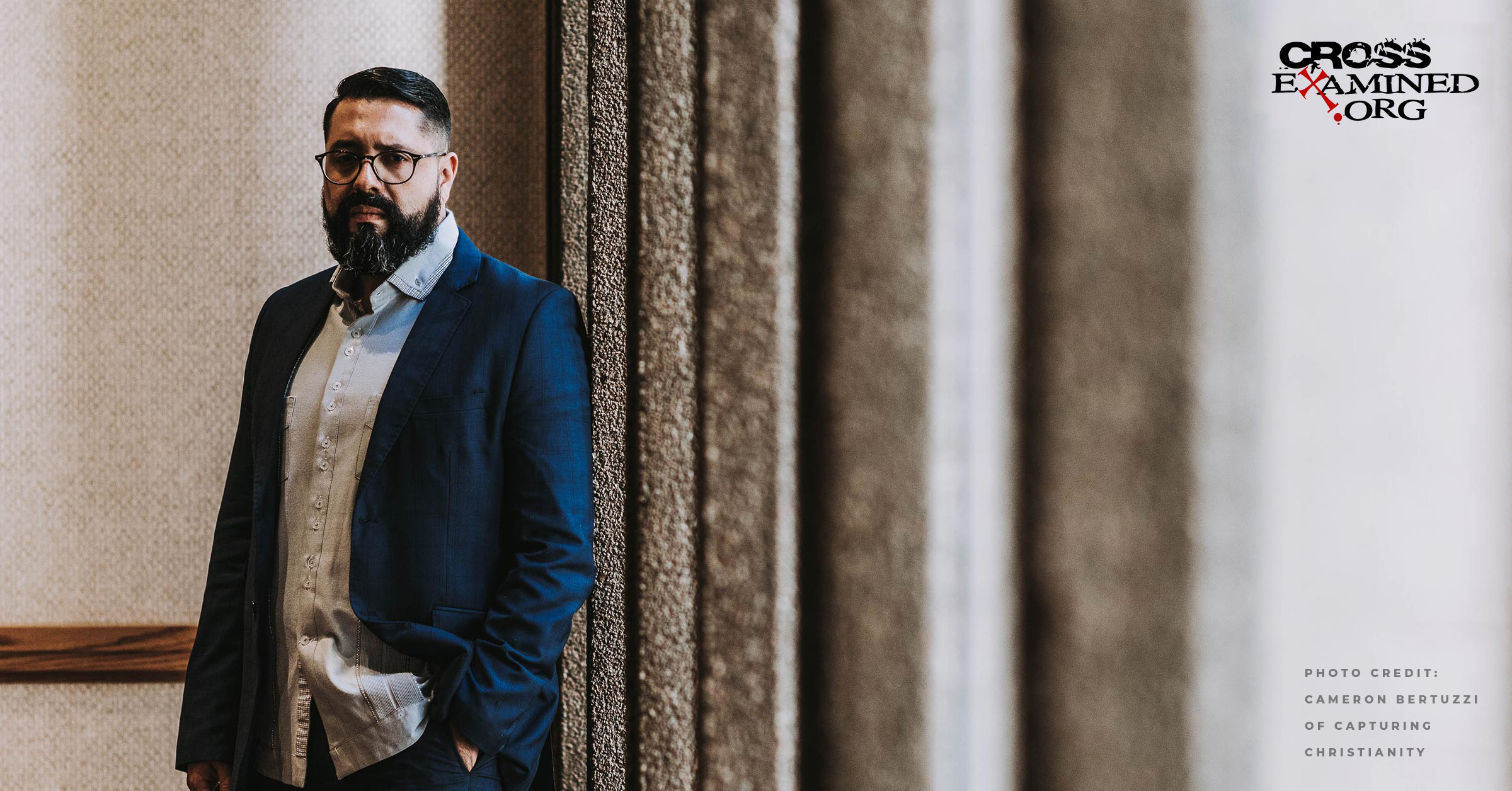14 Ways I Teach Apologetics to My 5-Year-Olds
Recently, several people have asked me, “How do you actually do this apologetics stuff at home? How do you talk to your kids about these topics?”
When I get the question, the person asking usually looks a bit baffled, as if they are asking how I build rockets.
The word apologetics sounds serious, I guess. A lot of people assume teaching their kids apologetics would involve some kind of formal event: Dad comes home from work with his suit and briefcase, loosens the tie (only slightly), then sternly gathers the children and announces, “Kids, it’s time to talk about…apologetics.”
All kidding aside, it doesn’t have to be like that at all! Ideally, we should incorporate apologetics into the way we teach our kids about Christianity. Today I want to give you 14 examples of how I do that with my 5-year-old twins. Obviously, the details of how I communicate with them are age-specific, but I hope this will give you an idea of how the foundation of apologetics fits right into our regular Bible study time.
There are three things to note about these examples:
- We do our best to have a nightly Bible time with the kids. That’s when these discussions take place. If you don’t yet have a “God time” set aside for your family, consider how you might do that.
- The starting point for doing any of this is having a knowledge of apologetics yourself. When you become familiar with the common challenges to Christianity, you’ll naturally start tailoring many of your discussions with your kids to address certain points. The first step in teaching your kids is simply teaching yourself.
- No 5-year-old will be prepared to make a case for and defend their faith based on the examples you’ll see below. That’s not the point. Just as you have to learn basic addition before you someday learn calculus, these concepts are foundational.
Here are 14 examples of teaching young kids apologetics:
- We frequently remind the kids that God has revealed Himself to people in TWO ways: through the Bible and through the world around us. It’s easy to slip this into everyday conversation when you make observations about the world around you!
Apologetics foundation: Makes kids aware that “natural theology” (what we can learn about God from nature) is an important part of God’s revelation. Since key arguments for God’s existence take place at this level (e.g., cosmological, design and moral arguments), thinking this way is good preparation.
- We often say that “without God, there would be nothing” to emphasize that God is the ultimate cause of everything. My daughter asked this week why we say this if we can get things like pumpkins at the grocery store. I asked her where the grocery store came from. She said people built it. I asked where they got the building materials. She saw where that was going and said, “Eventually, you keep going backward until things can’t just create themselves.” Exactly.
Apologetics foundation: This is one step toward the cosmological argument (God is the first cause of everything).
- We sometimes use our Bible time to study age-appropriate space books. This helps emphasize the idea that we can learn about God from the world around us (point 1). We discuss how huge the universe is and ask what we could know about the creator of it all even if we didn’t have a Bible (the cause of the universe must be outside of space and time, enormously powerful and able to choose to create).
Apologetics foundation: This is also a step toward the cosmological argument – God is the first cause, and we can know things about Him based on what He has made. Studying space books as part of Bible time also teaches kids that God and science are NOT at odds, as the world around them will claim.
- We talk about how amazing our Earth is for life and compare it to the other planets they are learning about in our solar system. For example, they understand that planets closer to the sun would be too hot for life and planets farther away would be too cold. We explain that God created Earth perfectly for life. We’ve introduced the idea that some people think it happened by “chance,” and how Christians instead believe it’s God’s design.
Apologetics foundation: This is a basic background for the fine-tuning argument.
- We’ve discussed how parents don’t have to teach their kids every single rule about doing the right thing. We throw out all kinds of scenarios and ask them what the right thing to do is. They get it right, and we ask how they knew that if we never told them what to do. Then we talk about how other people know the same right thing to do without being told. How does everyone know what’s good and bad? Because God has put those rules in our heart.
Apologetics foundation: This is a basic background for the moral argument.
- When we talk about people who don’t believe in God, we emphasize that they too can behave nicely – sometimes even more nicely than Christians! We explain that God placed his guide for what’s good and bad in every heart, whether a person believes in Him or not.
Apologetics foundation: This is a clarification to the moral argument (one a lot of adults still need to understand!).
- We’ve read through the World Vision Children’s Bible, which has a (true) story about world suffering after every few pages. Through this, our kids have encountered the reality of natural evil (hurricanes, tornadoes, floods, etc.) and moral evil (the suffering inflicted by wars, corruption, and greed). This led to weeks of conversations about the difference between natural and moral evil, and the fact that the problem of evil is one of the most difficult questions for humans to deal with.
Apologetics foundation: The problem of evil and suffering is one of the most significant challenges to Christianity. Rather than hiding it from our kids, we want them to grow up facing it directly and thinking through the difficulties. We talked at length about each story of suffering and why God may have allowed it to be part of our world.
- Our conversations from the World Vision Bible (see prior point) led us to the topic of free will, and how our free will can result in moral evil. My husband and I pretended to be robots that the kids created and said over and over (robotically), “I love you.” This (admittedly cheesy) act demonstrated that free will is necessary for us to genuinely love God. God didn’t just want robots. But that free will can be used to also make bad choices, which leads to much suffering.
Apologetics foundation: This helps explain the concept of free will, which is an important part of the response to the problem of evil.
- When our kids ask questions that no Christian has a definitive answer for, I make it a point to acknowledge that 1) the Bible doesn’t tell us everything we wish we knew, 2) I would like to know the answer myself, and 3) some people don’t believe in God because of that question (if applicable). For example, my son has asked quite a bit why God doesn’t show Himself more. I’ve told him this is my number one question about God! I go on to point out that some people say, “God seems to be way too hidden, so He must not exist.”
Apologetics foundation: When we acknowledge these points, we help set our kids’ expectations about faith – for example, there are some answers we will never have. It additionally helps them to understand why others believe the way they do.
- We have a night per week where there is no Bible story or lesson planned, and we just discuss whatever questions they have. If you do nothing else listed here, DO THIS. Start right where your kids already have questions.
Apologetics foundation: Setting aside time for questions each week teaches kids that their questions are important and that mom and dad value the opportunity to answer those questions.
- We’ve asked the kids, “Why should we believe what the Bible says? These stories about Jesus are from 2,000 years ago! How do you know the writers didn’t make up stories – like a Curious George book – and we believe it for no reason?” While a detailed discussion of the reliability of New Testament manuscripts is beyond them at this point, we’ve talked about the difference between authors intending to write fiction vs. non-fiction, how the New Testament writers wanted to carefully describe Jesus’ life, and how most of the disciples ended up being willing to die for what they said was true (we explained how they wouldn’t be willing to die for what they knew was a lie).
Apologetics foundation: This gets kids thinking about how we can know the Bible is trustworthy and lets them know there are good reasons to rely on God’s Word.
- I throw out statements that I hear atheists make to introduce them to other people’s thinking and respond accordingly. For example, when talking about the resurrection, I’ve roleplayed a non-believer and said, “I don’t believe the resurrection happened because I know dead people don’t come back to life!” (an “argument” I hear frequently). Then we talk about how no one naturally comes back to life. We explain that Christians believe Jesus was only able to come back to life because God exists and can work outside of how things normally function.
Apologetics foundation: This clarifies the nature and uniqueness of Jesus’ resurrection.
- When talking about Jesus’ miracles, we are sure to emphasize that they gave evidence that Jesus was who he said he was – God’s son. We point out that Jesus didn’t just tell people to believe what he was saying was true. He showed them by doing things regular people can’t do. We let them know that God values giving us enough evidence for us to decide to give our lives to Him.
Apologetics foundation: This emphasizes that we don’t need blind faith – God gives us reasons to believe!
- We regularly remind them that truth is not what you like the best, what makes the most sense to you, or what makes you the happiest. For example, we point out that we can’t make it rain just because we would like it to. In the same way, we shouldn’t decide what’s true about God based on what we would like to be true. We have to look at all the information He has given us – in the world around us and in the Bible – and discover what is true.
Apologetics foundation: This gets kids thinking about the nature of truth.
Natasha Crain is a blogger, author, and national speaker who is passionate about equipping Christian parents to raise their kids with an understanding of how to make a case for and defend their faith in an increasingly secular world. She is the author of two apologetics books for parents: Talking with Your Kids about God (2017) and Keeping Your Kids on God’s Side (2016). Natasha has an MBA in marketing and statistics from UCLA and a certificate in Christian apologetics from Biola University. A former marketing executive and adjunct professor, she lives in Southern California with her husband and three children.
Original Blog Source: http://bit.ly/2XgJJIU












Leave a Reply
Want to join the discussion?Feel free to contribute!